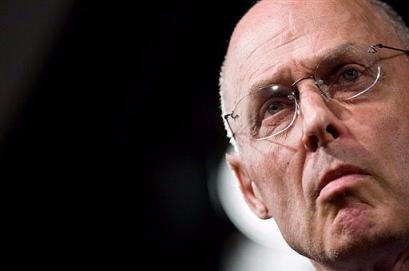
US authorities are scrapping plans to buy up toxic mortgages securities and shifting the focus of a massive financial rescue plan, Treasury Secretary Henry Paulson, seen here in October 2008 in Washington, DC said Wednesday.
WASHINGTON (AFP) – – US authorities are scrapping plans to buy up toxic mortgages securities and shifting the focus of a massive financial rescue plan, Treasury Secretary Henry Paulson said Wednesday.
Paulson said the 700-billion-dollar plan would focus now on continued capital injections to struggling banks, but would also look at ways to help the “nonbank” financial sector under the Troubled Asset Relief Program (TARP).
“Over these past weeks we have continued to examine the relative benefits of purchasing illiquid mortgage-related assets,” he said.
“Our assessment at this time is that this is not the most effective way to use TARP funds, but we will continue to examine whether targeted forms of asset purchase can play a useful role.”
The program approved by Congress was initially aimed at buying up so-called toxic mortgage securities that were clogging the financial system, but analysts had warned that such a plan could prove difficult to implement with prices hard to fix.
In the meantime, US officials had moved to emulate plans in Britain and elsewhere to tackle the credit squeeze by investing directly in banks.
Going further, Paulson said the Treasury would look at other types of consumer credit and asset-backed securities that are troubled. These could include credit card and auto loan debt that, like mortgages, are often packaged into securities sold to investors.
“The non-bank consumer finance sector continues to face difficult funding issues,” Paulson said.
“Specifically, the asset-backed securitization market has played a critical role for many years in lowering the cost and increasing the availability of consumer finance. This market is currently in distress, costs of funding have skyrocketed and new issue activity has come to a halt. Today, the illiquidity in this sector is raising the cost and reducing the availability of car loans, student loans and credit cards.”
Posted: 12 November 2008
Source: AFP